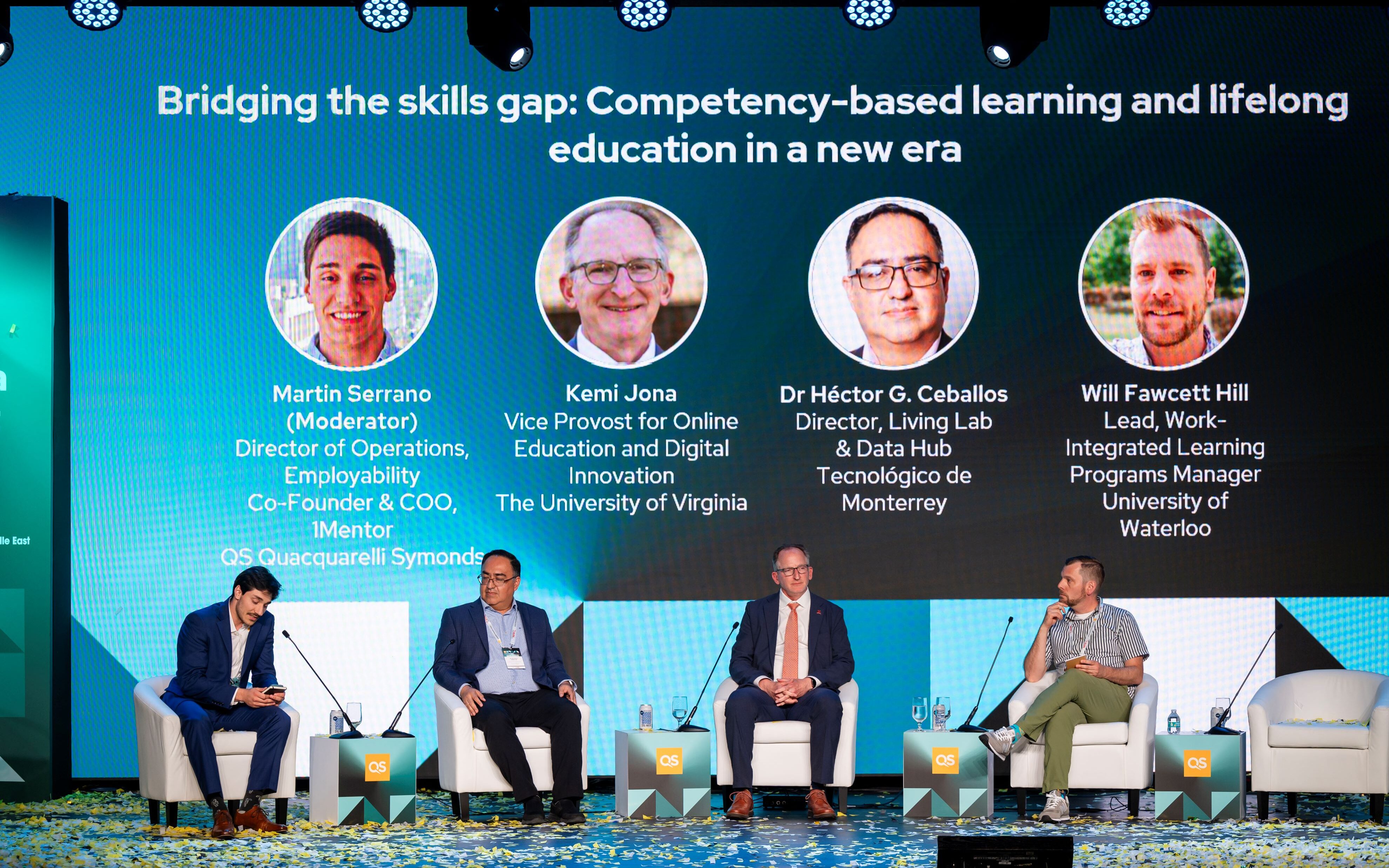
Harnessing the use of digital technology and AI was the core theme of the QS EduData Summit 2024.
At the Summit held in Washington D.C, leading voices in higher education underscored the significance of leveraging data and AI to shape educational strategies, enhance learning platforms and improve graduate outcomes.
The panel discussion, ‘Bridging the skills gap: Competency-based learning and lifelong education in a new era’, addressed this shift and explored the opportunities and challenges of integrating data-driven learning solutions, which universities – and students – will encounter.

Preparing students for a rapidly changing market
The first panel question focused on how institutions inform students about the new skills in demand. Will Fawcett, Lead for Work-Integrated Learning Programs Manager at University of Waterloo, shared the career progression initiatives in place at his institution: “The programme I run has tried to create that permissive and educational space about how to use AI to leverage skills and get further ahead. In particular, we’ve used it to mine employability skills to help students market themselves to employers and future job hunts. 1Mentor has been an excellent example of how to partner with a third-party provider to leverage AI in education.”
1Mentor, which was acquired by QS in January 2024, uses AI to gather data from over 170 million job listings and pinpoint the skills in demand by industry and identify any skills gaps.
This helps institutions to tailor academic programmes and career guidance to real-time skills demand and helps students to understand the skills they need to achieve their professional goals.
Instant data analysis for university job postings
Panel moderator Martin Serrano, Director of Operations, Employability at QS and Co-Founder and COO at 1Mentor, remarked, “We need to reach a point where universities receive data in real-time, rather than once every four years.”
To which Kemi Jona, Vice Provost for Online Education and Digital Innovation at The University of Virginia suggested utilising supplementary materials to encourage universities to adopt more data-driven approaches.
“In theory, whether you’re a faculty member, a dean, or a leader, we’re all trained as scientists and we’re all trained to work from data so we can have a difference in opinion. But, it’s always good to ground those conversations in real data by asking questions like ‘What are the student’s preferences?’; ‘What are their aspirations from an employability outcome?’; ‘How far is that from what the curriculum offers and what can we do about that?’ – whether this is within the curriculum or with supplementary materials and resources, this needs to be implemented if we cannot get the faculty or curriculum to change quickly enough.
“It’s a tough conversation that will be made easier if we can all be looking at the same data and have a less emotional but more data-driven conversation about it.”
“Productive failure is at the core of our programme and it’s something we really lean into.“
Will Fawcett, Lead for Work-Integrated Learning Programs Manager at University of Waterloo
Empowering underrepresented students for successful work placements
Will indicates that students might face challenges in communication and interpersonal skills within the competitive academic environment. This struggle becomes particularly daunting as students engage in frequent job interviews and compete for limited positions.
“Especially if English is your second language or you have any challenges such as anxiety or being shy. Our programme offers this space in which students can practise and provides a safe space in which they can fail with minimal consequence.
“They can take what they’ve learned and apply it to their next job opportunity. Productive failure is at the core of our programme and it’s something we really lean into.”
Unravelling competency and skills
Later in the panel, Dr Hector G. Ceballos, Director of the IFE Living Lab and Data Hub at Tecnologico de Monterrey, emphasises that competency and skills are “not the same” but are often used “interchangeably”.
“When we talk about competency, we’re talking from an academic perspective. And when we’re talking about skills, we’re referring to what is needed in industry and these terms are not the same thing. We need to ‘translate’ both terms because we are teaching programming, for example, but the industry is asking for Python, text and other language processing tools.”
How can institutions go about integrating data-driven learning solutions into their university programmes?
“There’s no secret to unlocking innovation”, Kemi explained, “You must have conversations and build a coalition of will. In my case, one of the ways to unlock that was to take the initial risk off the table with regards to the expense of trying a new tool and seeing how it worked, and whether we wanted to keep going. Try looking for opportunities to creatively infuse data and tools into lots of different spaces and see where it takes you.”
“First, acknowledge your strengths” Will added, “Then lean into or seek support from third-party actors who can move more quickly, are more agile, and who do have their finger on the pulse of in-demand skills in industry and leverage that expertise in efficient and cost-effective ways.”



